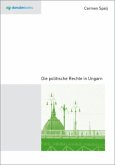This timely book examines far-right politics in Hungary-but its relevance points much beyond Hungary. With its two main players, the radical right Jobbik and populist right Fidesz, it is an essentially Eastern European, European, and global phenomenon. Jobbik and Fidesz, political parties with a populist, nativist, authoritarian approach, Eastern and pro-Russian orientation, and strong anti-Western stance, are on the one hand products of the problematic transformation period that is typical for post-communist countries. But they are products of a "populist Zeitgeist" in the West as well, with declining trust in representative democratic and supranational institutions, politicians, experts, and the mainstream media. The rise of politicians such as Nigel Farage in the UK, Marine Le Pen in France, Norbert Hofer in Austria, and, most notably, Donald Trump in the US are clear indications of this trend. In this book, the story of Jobbik (and Fidesz), contemporary players of the Hungarian radical right scene, are not treated as separate case studies, but as representatives of broader international political trends. Far-right parties such as Jobbik (and increasingly Fidesz) are not pathologic and extraordinary, but exaggerated, seemingly pathological manifestations of normal, mainstream politics. The radical right is not the opposite and denial of the mainstream, but the sharp caricature of the changing national, and often international mainstream.
"Today, more than ever, there is a clear need for objective research on far right populism. In this book, Peìter Krekoì and Attila Juhaìsz draw on solid and unparalleled research to lift the lid on the far right in Hungary, and within the context of a literature that has for too long focused mainly on Western Europe. Make no mistake-these are the world's leading experts on the right in Hungary, which makes this book essential reading for all those who are interested not only in this country but in the far right across the West."-Matthew J. Goodwin, Professor, Politics and International Relations, Rutherford College








